James McLaughlin Smith
Operetta Research Center
6 March, 2019
First, I learned that Michael and Nan Miller had bequeathed their extraordinary Operetta Archive to the University of California at Santa Barbara Library. And in recognition of this gift, the Department of Music’s Opera Theatre would present the “American premiere” of Lehár’s Die Juxheirat, in a new English translation, as The Mock Marriage.
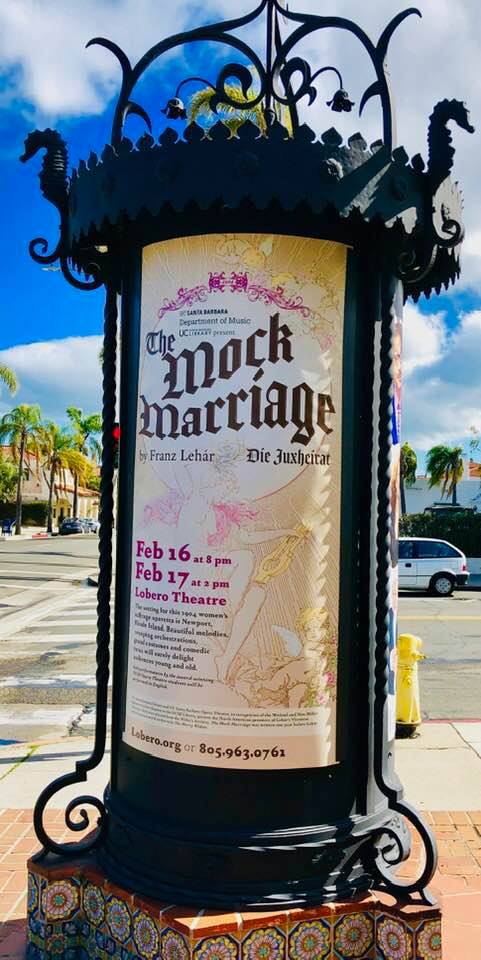
Advertisement for Lehár’s “The Mock Marriage” (“Die Juxheirat”) in Santa Barbara, California. (Photo: Private)
Dealing with women’s lib à la 1904, it was declared daring and ahead of its time, thus making it altogether ripe for re-examination today. I read what I could find in English, which included Kevin Clarke’s two articles for Operetta Research Center, but couldn’t locate a German-English libretto.
I then downloaded the recent CPO recording (sans libretto) and found it, musically at least, full of verve, charm and agreeable melodies which perhaps do not rise to the level of mega-hit memorable.
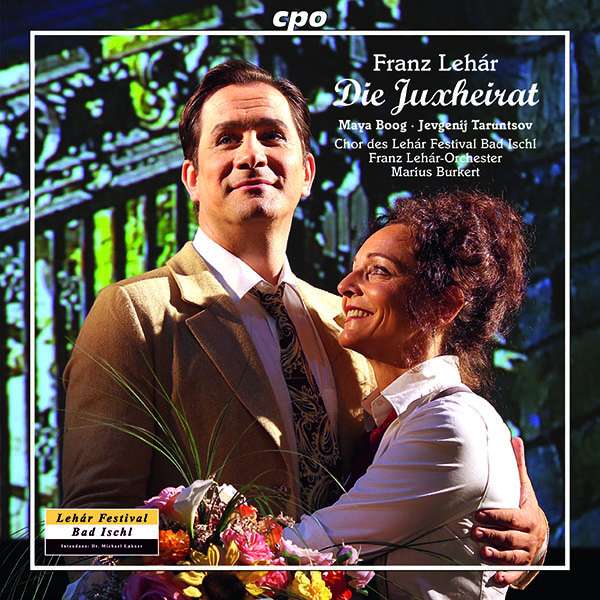
The CD cover for Lehár’s “Die Juxheirat,” 2016 live recording on cpo.
Nonetheless, whetted, I trekked to full of verve, charm and agreeableness Santa Barbara for the Lobero Theatre performance, ready for some ‘radical feminism, cross-dressing and homoeroticism.’
Note: this intricately plotted multi-character piece requires a deft touch to pull off. (Well, what doesn’t, really?)
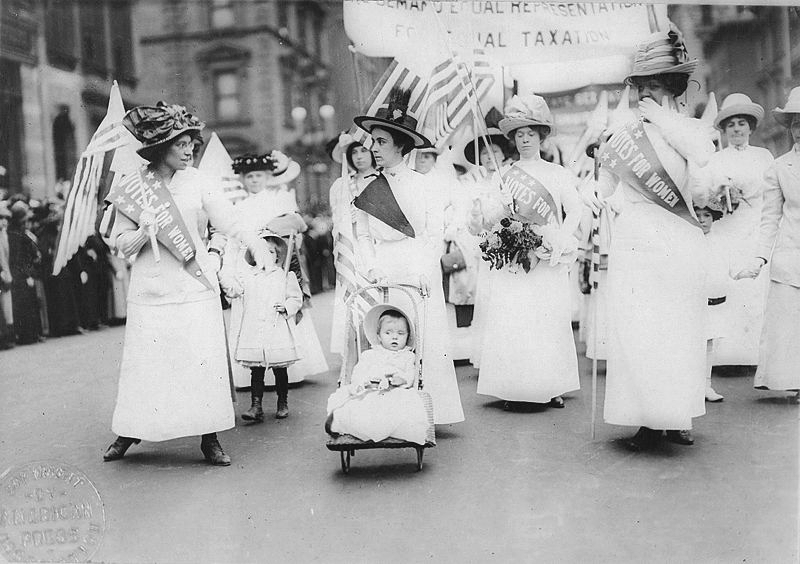
Suffragette demonstration in New York City, 1912.
You need eight, count-em eight, gifted farceurs who also can sing. And Steven Daigle (who also directs) has provided a very funny version of Julius Bauer’s highly regarded original that he’s peppered with lots of choice anti-male zingers.
But in the performance I saw, I’m not certain his book got all of the laughs it deserved. The all-student cast did have some standouts, but for some, the spot-on wait-for-the laugh timing was elusive. Further, the supertitles were dim and difficult to decipher from my vantage point, so some of the otherwise excellent English lyrics by Gregg Opelka were lost on me.
Unlike most operettas, this one eschews Eurocentrism for Newport, Rhode Island, amidst the super rich. And gets off to a bracing, ‘modern’ start with the heroine’s father’s mock lament: “pity the poor billionaire,” giving unbridled capitalism a good satiric jab.
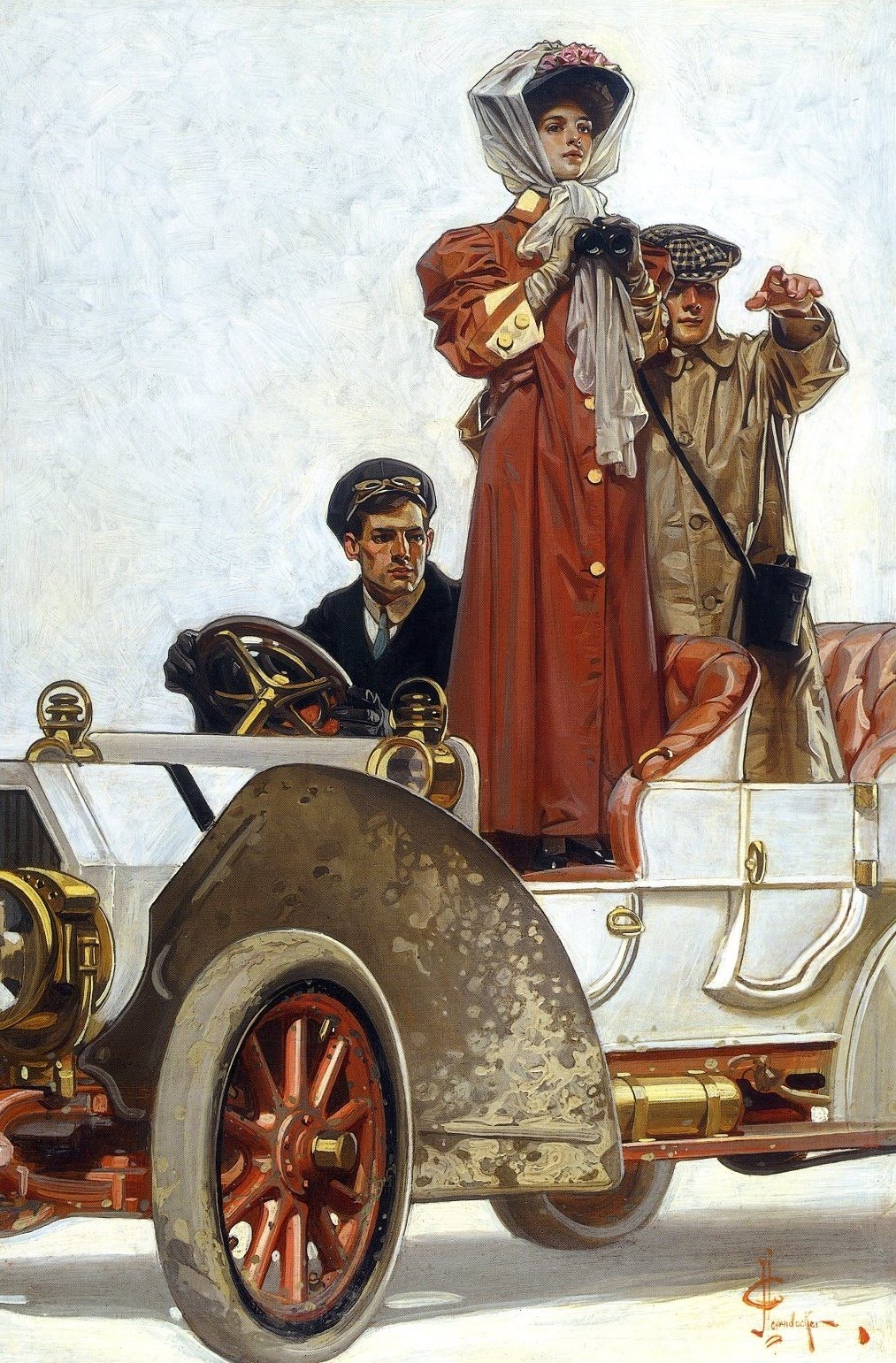
Painting by J. C. Leyendecker of a chauffeur escorting a lady around.
We then meet his daughter, Selma, recently widowed, and so consumed with distrust of men she has given them up for good. Not only that, she has formed a society of like-minded gal pals and adopted a hyper-militant stance against the patriarchy. Their motto: Women Hate All Men. W.H.A.M.!
The WHAM quartet gathers, and each sings a sad male tale. Their personas are delineated in broad strokes, the cast doing its best to fill in with fun character detail. We laugh with them, we laugh at them, and it’s pretty sharp satire, but does it attain ‘radical queerness’? It’s a stretch, and I couldn’t quite quell an unwanted recollection of those blue nosed ladies from River City, Iowa.
The period costumes didn’t help. Selma swears to never again marry, as do her three cohorts, in support, though each has a past suitor still in the picture. But Selma’s dad has his own agenda in place and has earmarked an associate, Harold, as ideal husband material. However, Harold has a sister, Juliane, who has it out for Selma for stealing a guy from her years ago, and when she hears of papa’s plan to fix Harold up with Selma, she concocts one of her own that’s pure snarky revenge.
She infiltrates WHAM under an alias and confides to Selma that this suitor guy Harold has a sister that likes to dress and act like a man, even passing herself off as one, in order to gain intel on the women Harold meets. Selma takes the bait and agrees to meet this sister in her “Harold” persona. She too has something subversive in mind.
Note: now, at this point I’m perplexed, as the actress playing Juliane is short and dark, while the actor playing Harold, whom we have seen earlier, is tall and blond. And if they are not only brother and sister, but twins to boot, how can cross-dressing possibly work? Well, it can’t, of course, because it doesn’t play out that way.
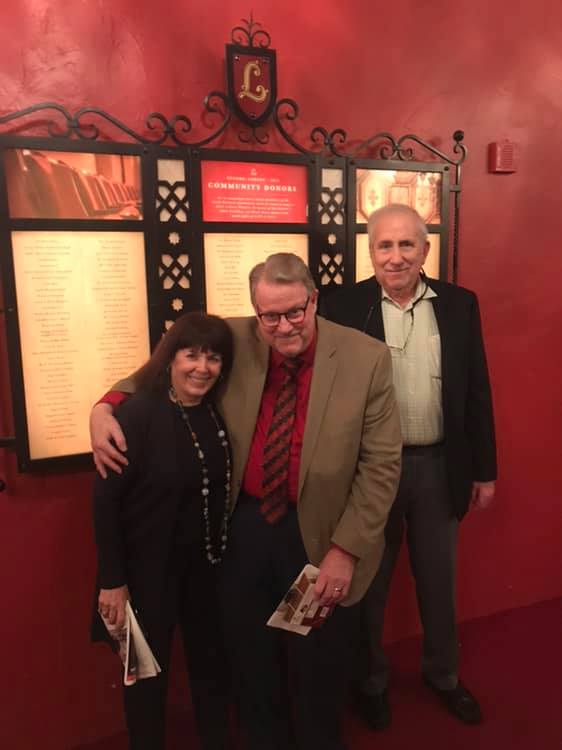
Steven Daigle (middle) with Nan and Michael Miller at the Lobero Theatre, Santa Barbara, CA. (Photo: Private)
Harold, the real one, arrives and meets Selma, who believes it’s really his sister dressed and coiffed to look exactly like him. (It works, though is perhaps not quite as much fun as if Julianne herself had pretended to be Harold, thereby giving us some titillating female to female interaction. I don’t know the Bauer original, but assume this version follows it correctly.)
I did find it a bit difficult to hang on to the conceit that Selma could stand next to “Harold,” look him in the eye, and still believe she was seeing a woman. (It might have helped the credibility if Harold had been given some foppish gestures ala Zorro’s alter ego in The Mask of …)
Anyway, Selma, in an act of cheeky bravado, challenges “Harold” to kiss her, publicly. Harold, intrigued, complies, giving Selma the belief she has pulled off a very shocking coup. The audience knows it too would be shocked if it believed the gender swap, but also realizes that what it has really witnessed is this heterosexual couple’s self-fulfilling prophecy. After witnessing the kiss, the out-of-the-loop papa immediately declares an engagement mandatory. His pal, the Sheriff, just happens to be ready with some sketchy Rhode Island paperwork, and WHAM, the two become, in the triumphant eyes of Selma, if no one else, ‘wife’ and wife. Her exultation is short-lived, as later, at a celebration, Juliane is announced, and she enters proudly, knowing the TKO is actually in her favor. Selma puts two and six together and realizes she’s been had.
In another greatly anticipated scene (earlier), we witness the speed-loving, womanizing, but likable chauffeur, Philly, observe the too-stiff Harold, and conclude he needs a ‘how to handle a woman’ lesson in order to hookup with Selma. Philly instructs Harold to “pretend you’re a woman and I’ll show you what to do…” He then sings of various ‘dos and don’ts’ in an amusing mash up of Wagner motifs, while Harold fends off his physical advances.
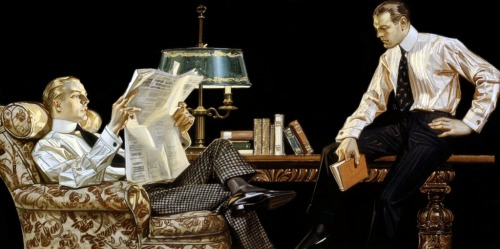
Classic man-on-man action as imagined by J. C. Leyendecker at the beginning of the 20th century.
But as played, something got lost in translation. Their interaction in this ‘mock seduction’ provided zero male-on-male frisson, and I would love to know what’s in the original text. Some months later, all involved, minus Harold, are gathered at a Hudson River hunting lodge, including the now-disbanded WHAM gals who have wasted no time in picking up where they left off with their respective guys.
Selma, having had plenty of time to stew, wonders why Harold has been among the missing for so long. When Harold does show, he has divorce papers in hand, eager to put an end to this “ungentlemanly mock marriage.” But Selma grabs them and tears them in half, an act which unleashes the real feelings the couple have for each other and the law of attraction fulfills its purpose.
Happy endings all around… and so much for hard-core feminism: WHAM-bam-no, thank you, ma’m!
Well, hold on. All was not lost. Important human issues were raised, and we had some fun with them, but they certainly didn’t go away, as we the living can testify. And we were reminded that adults can also co-habit in mutually respectful harmony.
Some of the time.

I love mi-nus … otherwise …